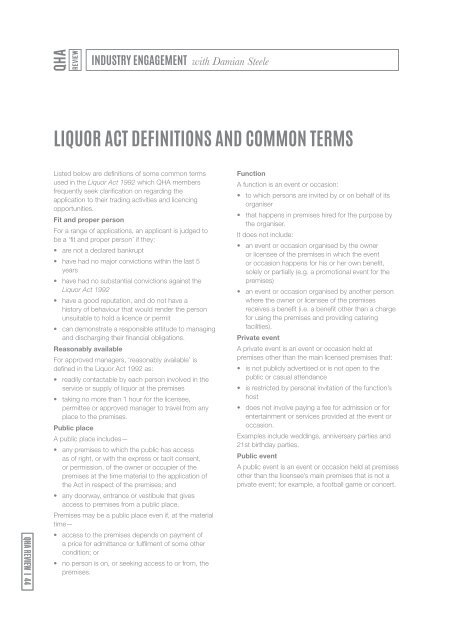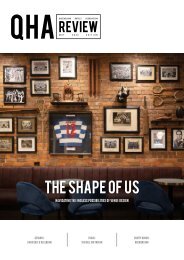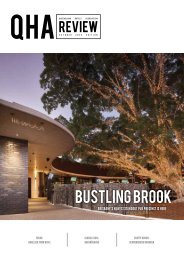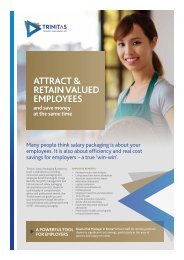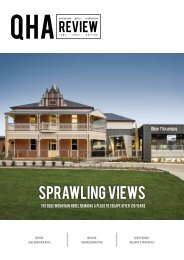QHA_August-2021-Digital
You also want an ePaper? Increase the reach of your titles
YUMPU automatically turns print PDFs into web optimized ePapers that Google loves.
INDUSTRY ENGAGEMENT<br />
with Damian Steele<br />
LIQUOR ACT DEFINITIONS AND COMMON TERMS<br />
<strong>QHA</strong> REVIEW | 44<br />
Listed below are definitions of some common terms<br />
used in the Liquor Act 1992 which <strong>QHA</strong> members<br />
frequently seek clarification on regarding the<br />
application to their trading activities and licencing<br />
opportunities.<br />
Fit and proper person<br />
For a range of applications, an applicant is judged to<br />
be a ‘fit and proper person’ if they:<br />
• are not a declared bankrupt<br />
• have had no major convictions within the last 5<br />
years<br />
• have had no substantial convictions against the<br />
Liquor Act 1992<br />
• have a good reputation, and do not have a<br />
history of behaviour that would render the person<br />
unsuitable to hold a licence or permit<br />
• can demonstrate a responsible attitude to managing<br />
and discharging their financial obligations.<br />
Reasonably available<br />
For approved managers, ‘reasonably available’ is<br />
defined in the Liquor Act 1992 as:<br />
• readily contactable by each person involved in the<br />
service or supply of liquor at the premises<br />
• taking no more than 1 hour for the licensee,<br />
permittee or approved manager to travel from any<br />
place to the premises.<br />
Public place<br />
A public place includes—<br />
• any premises to which the public has access<br />
as of right, or with the express or tacit consent,<br />
or permission, of the owner or occupier of the<br />
premises at the time material to the application of<br />
the Act in respect of the premises; and<br />
• any doorway, entrance or vestibule that gives<br />
access to premises from a public place.<br />
Premises may be a public place even if, at the material<br />
time—<br />
• access to the premises depends on payment of<br />
a price for admittance or fulfilment of some other<br />
condition; or<br />
• no person is on, or seeking access to or from, the<br />
premises.<br />
Function<br />
A function is an event or occasion:<br />
• to which persons are invited by or on behalf of its<br />
organiser<br />
• that happens in premises hired for the purpose by<br />
the organiser.<br />
It does not include:<br />
• an event or occasion organised by the owner<br />
or licensee of the premises in which the event<br />
or occasion happens for his or her own benefit,<br />
solely or partially (e.g. a promotional event for the<br />
premises)<br />
• an event or occasion organised by another person<br />
where the owner or licensee of the premises<br />
receives a benefit (i.e. a benefit other than a charge<br />
for using the premises and providing catering<br />
facilities).<br />
Private event<br />
A private event is an event or occasion held at<br />
premises other than the main licensed premises that:<br />
• is not publicly advertised or is not open to the<br />
public or casual attendance<br />
• is restricted by personal invitation of the function’s<br />
host<br />
• does not involve paying a fee for admission or for<br />
entertainment or services provided at the event or<br />
occasion.<br />
Examples include weddings, anniversary parties and<br />
21st birthday parties.<br />
Public event<br />
A public event is an event or occasion held at premises<br />
other than the licensee’s main premises that is not a<br />
private event; for example, a football game or concert.


